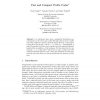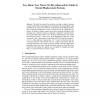6 search results - page 1 / 2 » Bit Recycling with Prefix Codes |
DCC
2007
IEEE
14 years 4 months ago
2007
IEEE
Many data compression methods cannot remove all redundancy from a file that they compress because it can be encoded to many compressed files. In particular, we consider the redund...
SOFSEM
2010
Springer
13 years 2 months ago
2010
Springer
It is well-known that, given a probability distribution over n characters, in the worst case it takes (n log n) bits to store a prefix code with minimum expected codeword length. H...
NETWORKING
2008
13 years 6 months ago
2008
Due to the increasing size of IP routing table and the growing rate of their lookups, many algorithms are introduced to achieve the required speed in table search and update or opt...
DNA
2011
Springer
12 years 4 months ago
2011
Springer
We study the potential for molecule recycling in chemical reaction systems and their DNA strand displacement realizations. Recycling happens when a product of one reaction is a rea...
DCC
1996
IEEE
13 years 9 months ago
1996
IEEE
Abstract--Minimum redundancy coding (also known as Huffman coding) is one of the enduring techniques of data compression. Many efforts have been made to improve the efficiency of m...


